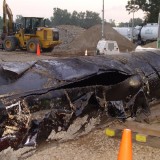I have received a lot of feedback on my recent blog on John Weston, MP.
Let me say that this was directed to Weston because he is my MP and it applies with equal force to all Tory MPs from British Columbia.
I’ve been asked if I would resign were I in John’s position and I say YES. Now, I realize that’s easy to say – he who has not sinned has not been tempted. I have no doubt, however. I sat in a cabinet that had half a dozen ministers who would have resigned under these circumstances. Premier Bill Bennett recognized this and it was taken into his consideration, I’m sure.
Now, under our system – such is the measure of its idiocy – all elected members on the government side must often compromise, otherwise the government couldn’t function. There were occasions where cabinet passed policy that I had spoken out against in the past and I told the press that when cabinet makes a decision all must support it. But these were areas of policy, not matters that go to the root of your commitment to your voters and your constituency. They were not matters of conscience. Any who have sat on the board of, say, a golf club will readily get the distinction between matters of business and matters of conscience. Premier Bill Bennett understood the distinction – Stephen Harper, no doubt also understands but he knows his backbenchers well and knows that there is almost nothing that goes to the conscience of his MPS because they have none.
Let’s be clear what issues we’re talking about here.
The environment of BC as a whole is not merely threatened but is on the brink of disaster from policy decisions already taken by the Harper government. I refer, of course, to its support of the Enbridge pipeline and expansion of Kinder Morgan’s pipeline to Vancouver; its open support of tankers loaded with deadly bitumen from the Tar Sands; its ongoing support of the Department of Fisheries and Oceans to promote fish farms while their statutory basic raison d’etre is to protect our salmon; and its utter abandonment of protection of fish habitat as demonstrated in its gutting of the DFO in BC.
These, I contend, are not merely matters of policy but go the very root of what British Columbia is and as such simply cannot be supported by any Member of Parliament from our province.
Ask yourself this: if in the past election Tory candidates were asked if they support the above policies, I suggest that not one of them would have answered yes. If they had been and they replied that they were for these policies they would never have been elected and they know that.
I pick on Weston because, as I say, he’s my MP. In fact, the entire BC Conservative caucus ought to resign en masse. That they haven’t and won’t brands them as they are – lickspittles and toadies who put their parliamentary seat before their duty.
My prediction is that Weston will be rewarded with a cabinet seat in the next major shuffle – after all, he has been faithful to Harper and he’s moved his family back to Ottawa, which move could well have come from a nod or a wink from Harper.
After all, if sacrificing your constituency and your province for personal gain is to mean anything, there must be a reward and in my view it will come.




